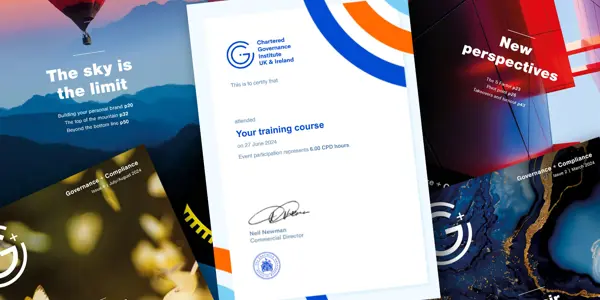Overview
In today's rapidly evolving digital landscape, simply 'keeping everything' is no longer an option. The advent of GDPR and the rise of Artificial Intelligence have fundamentally reshaped how organisations must approach document retention. Are your current practices a ticking time bomb of non-compliance, or a strategic asset for growth and efficiency? This course will equip you with the knowledge and tools to transform your document retention from a legacy burden into a powerful driver of governance, risk management, and operational excellence.
Course purpose:
To provide participants with a comprehensive understanding of best practices in document retention, integrating the critical requirements of GDPR and the emerging considerations of Artificial Intelligence. The course aims to empower professionals to develop and implement robust, legally compliant, and strategically advantageous document retention policies and procedures within their organisations, mitigating risks and optimising information governance in the digital age.
Course costs (ex VAT)
Non-member - £550
Professional subscriber - £495
Member - £440
A discount is available for registered charities, please email [email protected].
For any related enquiries please contact us at [email protected], or call us at +44 (0)20 7580 4741
Learning outcomes
By the end of the day you will understand:
- Understand the legal and regulatory landscape: Articulate the key principles of GDPR (e.g., storage limitation, purpose limitation, data minimisation) as they apply to document retention
- Assess risk and ensure compliance: Identify the risks associated with inadequate or non-compliant document retention practices, particularly in the context of personal data and AI-driven processes
- Develop robust retention policies: Design and implement comprehensive document retention policies that align with legal obligations, business needs, and ethical considerations
- Integrate AI considerations: Analyse how AI technologies (e.g., for data processing, analysis, and automation) impact document retention, including data lineage, training data retention, and automated decision-making
- Manage electronic and physical records: Apply best practices for the retention, management, and secure disposal of both electronic and physical documents
- Implement effective procedures: Establish practical procedures for record keeping, archiving, and secure deletion, considering the nuances of different data types and systems
- Navigate data subject rights: Understand and effectively respond to data subject requests (e.g., right to erasure) in the context of document retention
- Drive organisational change: Advocate for and implement a culture of proactive and compliant information governance within their organisation
Who is this course for
This course is ideal for anyone responsible for managing, storing, processing, or disposing of organisational documents and data. This includes:
- Governance & Legal Professionals
- Company Secretaries and Secretarial Teams
- Compliance Officers
- Data Protection Officers
- Any individual seeking to understand the intersection of document retention, GDPR, and AI
This course is relevant across all sectors (listed and private companies, charities, public sector, and the NHS)
Post-course action:
Participants will be encouraged to:
- Conduct a self-assessment of their organisation's current document retention policies against the principles and practices learned
- Initiate discussions within their organisation about integrating GDPR and AI considerations into existing retention schedules
- Begin drafting or updating sections of their document retention policy using the provided template and guidance
- Utilise the 6-month complimentary subscription to access relevant resources and stay updated on evolving regulations and best practices
You will also receive:
- Comprehensive course notes and presentation slides
- A practical guide to developing a GDPR and AI-compliant document retention policy (template included)
- Checklists for assessing current document retention practices
- Resource list for further reading and regulatory guidance
- Certificate of 6 hours CPD attendance
- 6 months complimentary professional subscription of The Chartered Governance Institute UK & Ireland

People who take this course often go on to book:
- Introduction to Subsidiary Governance
- Introduction to Corporate Governance
- Essential Corporate Governance
- Board & Committees – how to build an effective governance framework
- Risk Management Fundamentals Masterclass
- Risk Governance and Leadership Masterclass
Useful CGI Resources:
- Corporate Governance unlocked
- Effective Minute Taking
- A wealth of further information and guidance on governance practices and minute taking can be found in our Resources.
Competency framework
This course aligns to CGI’s competency framework: Entry/Emerging
Use the competency framework to identify your strengths and areas for improvement in governance.
Programme
Re-visiting the core principles of document retention. Discussing the significant risks of inadequate or non-compliant practices. Introduction to the evolving digital landscape and data explosion.
Understanding GDPR's core principles (storage limitation, purpose limitation, data minimisation). Participants will work in small groups to identify how these principles apply to specific document types within an organisation.
Exploring how AI impacts document retention: AI-driven data processing, training data, automated decision-making, data lineage. Ethical considerations and potential biases.
Step-by-step guide to developing/ updating a document retention policy. Participants will work in small groups to outline a section of a retention policy, incorporating GDPR and AI considerations
Strategies for effective policy implementation: communication, training, roles, and responsibilities. Discussing common challenges in managing data subject requests (e.g., right to erasure) in the context of retention.
Discussing future trends in data regulation and AI. The importance of ongoing review and adaptation. Facilitated group reflection on individual organisation's next steps.
Participants will engage in individual reflection and develop an action plan for applying their learning in their own contexts. The session will conclude with a whole-group discussion, Q&A, and a course evaluation.
